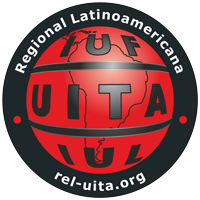Latin America | UNIONS | LGBTI
Fist meeting of the IUF’s Latin American LGBTI Committee
In Gisele Adão’s words
Pieced together little by little
On Wednesday, August 11, the IUF’s Latin American LGBTI Committee held its first virtual meeting. Gisele Adão, vice president of the Global Committee of our International Federation, welcomed the participants. Below are the main points of what she said.
Amalia Antúnez

Photo: Jaqueline Leite
I feel an immense joy being here at this meeting today. All the challenges, struggles, prejudices, and obstacles that we have managed to overcome since we began this journey in 2016 are running through my head like a movie.
What stands out is the unity of the people in this group who, despite the discrimination and social rejection most have suffered, are here now embracing this cause in defense of the rights of LGBTI people.
Our struggle, which we used to have to wage alone, is now everyone’s struggle, and it continues. That’s something that fills me with joy.
I remember the first flyer, the first interview, the first diversity meeting of the IUF in Latin America, and from then on all the activities we have organized together.
Seeing the changes, the transformation that we are achieving in people’s lives, not just in the diverse gender community, but also within the labor movement, is encouraging.
I have seen how fellow unionists in Latin America are building spaces to address the issue of LGBTI rights as something fundamental, as a struggle for life, for human dignity, for human rights.
We unionists must, above all, defend human beings, and we’re achieving that here.
Words are not enough to thank this Latin American Collective that we have built little by little, piece by piece. We started it, Eduardo (Medeiros) and I, and now there’s 24 of us debating and fighting for the rights of LGBTI people. And we’re aiming for more.
I always think that I am in the right place, because as a union leader I want to contribute to change the lives of LGBTI workers for the better. Most need employment to stop getting beaten up, humiliated, killed.
So it’s not simply an issue, it’s not just a matter of paying lip service to inclusion. It’s a spiritual change. It’s having organizations in the labor movement that don’t just fight for wage increases but to improve the living conditions of workers.
We’re gradually achieving that change. We started with the unions, we continued with our communities, and one day soon we’ll be seeing a transformation of society, of Latin America and the world.
